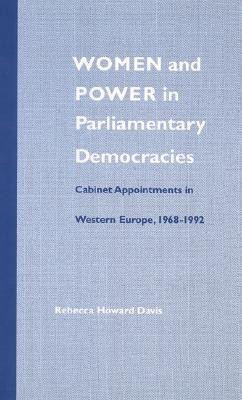
- We will send in 10–14 business days.
- Author: Rebecca Howard Davis
- Publisher: University of Nebraska Press
- ISBN-10: 0803217072
- ISBN-13: 9780803217072
- Format: 16.3 x 24.6 x 2 cm, hardcover
- Language: English
- SAVE -10% with code: EXTRA
Women and Power in Parliamentary Democracies (e-book) (used book) | bookbook.eu
Reviews
Description
Margaret Thatcher, Mary Robinson, Gro Harlem Brundtland, Edith Cresson, and Simone Veil--these contemporary world leaders are as noteworthy for their gender as they are for the political directions they have provided. Indeed, female government leaders are so rare as to be almost an intellectual curiosity. Why is this the case? Why do women, who make up more than half of the world's population, occupy so few positions at the highest levels of political power? Why are women making inroads in government in some countries while not in others? And what difference does women's presence--or absence--make in terms of policy outcomes? Davis addresses these questions by examining women's access to power through appointive channels in Western European parliamentary and parliamentary-type systems. Tracing women's participation from 1968 to 1992 in fifteen countries, she accounts for the variation from high levels of women's representation in Norway and Sweden to low levels in Italy and Britain. Little research on women and elections extends beyond the United States and Britain. Even less exists on women's access to power through appointive channels. By comparatively examining the elite recruitment of women through appointments, this work fills a critical gap.
EXTRA 10 % discount with code: EXTRA
The promotion ends in 20d.05:47:33
The discount code is valid when purchasing from 10 €. Discounts do not stack.
- Author: Rebecca Howard Davis
- Publisher: University of Nebraska Press
- ISBN-10: 0803217072
- ISBN-13: 9780803217072
- Format: 16.3 x 24.6 x 2 cm, hardcover
- Language: English English
Margaret Thatcher, Mary Robinson, Gro Harlem Brundtland, Edith Cresson, and Simone Veil--these contemporary world leaders are as noteworthy for their gender as they are for the political directions they have provided. Indeed, female government leaders are so rare as to be almost an intellectual curiosity. Why is this the case? Why do women, who make up more than half of the world's population, occupy so few positions at the highest levels of political power? Why are women making inroads in government in some countries while not in others? And what difference does women's presence--or absence--make in terms of policy outcomes? Davis addresses these questions by examining women's access to power through appointive channels in Western European parliamentary and parliamentary-type systems. Tracing women's participation from 1968 to 1992 in fifteen countries, she accounts for the variation from high levels of women's representation in Norway and Sweden to low levels in Italy and Britain. Little research on women and elections extends beyond the United States and Britain. Even less exists on women's access to power through appointive channels. By comparatively examining the elite recruitment of women through appointments, this work fills a critical gap.


Reviews